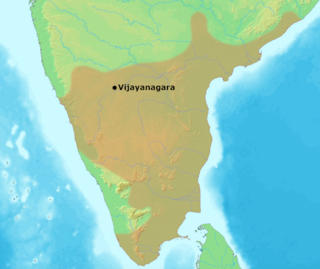
The Vijayanagara Empire or the Karnata Kingdom was a late medieval Hindu empire that ruled much of southern India. It was established in 1336 by the brothers Harihara I and Bukka Raya I of the Sangama dynasty, members of a pastoralist cowherd community that claimed Yadava lineage.
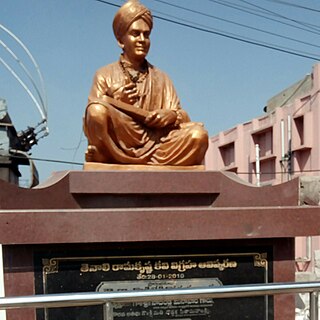
Tenali Ramakrishna, was a Telugu language poet, scholar, thinker and a special advisor in the court of the Vijayanagara king Krishnadevaraya, who ruled from 1509 to 1529 CE. He hailed from the village of Tenali and wrote poetry in Telugu. He is generally known for the folk tales which focus on his wit. He was one of the Ashtadiggajas, the eight poets in the court of Krishnadevaraya.

Krishnadevaraya was an emperor of the Vijayanagara Empire reigning from 1509 to 1529. He was the third monarch of the Tuluva dynasty, and is considered to be one of the greatest rulers in Indian history. He ruled the largest empire in India after the fall of the Islamic Delhi Sultanate. Presiding over the empire at its zenith, he is regarded as an icon by many Indians. Krishnadevaraya earned the titles Andhra Bhoja, Karnatakaratna Simhasanadeeshwara, Yavana Rajya Pratistapanacharya, Kannada Rajya Rama Ramana, Gaubrahmana Pratipalaka and Mooru Rayara Ganda. He became the dominant ruler of the peninsula by defeating the sultans of Bijapur, Golconda, the Bahmani Sultanate and the Gajapatis of Odisha, and was one of the most powerful Hindu rulers in India.
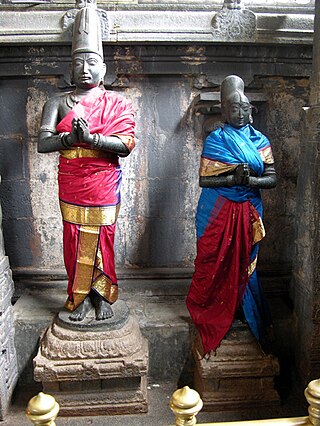
Achyuta Deva Raya was an emperor of Vijayanagara who succeeded his older brother, Krishnadevaraya, after the latter's death in 1529 CE.
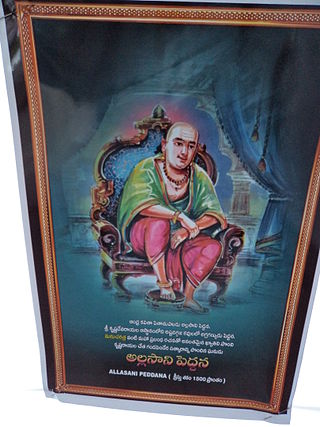
Mahakavi Allasani Peddana was a prominent Telugu poet and the foremost Ashtadiggaja in the imperial court of Emperor Krishnadevaraya of Vijayanagara.
Mahakavi Nandi Thimmana was a Telugu poet and an Ashtadiggaja in the imperial court of Emperor Krishnadevaraya of Vijayanagara. He is often called Mukku Thimmana after his celebrated poem on a woman's nose.

Ashtadiggajas is the collective title given to the eight great Telugu scholars and poets in the court of Emperor Krishnadevaraya, who ruled the Vijayanagara Empire from 1509 until his death in 1529. During his reign, Telugu literature and culture reached its zenith. In his imperial court, these eight poets were regarded as the eight pillars of his literary assembly. The age of Ashtadiggajas is called the Prabandha Age. Each Ashtadiggaja had composed at least one Prabandha Kavyamu, and it was the Ashtadiggajas who gave Prabandha its present form. Most Ashtadiggajas were from Rayalaseema. The Ashtadiggajas Allasani Peddana, Dhurjati, Nandi Thimmana, Madayyagari Mallana and Ayyalaraju Ramabhadrudu were from Rayalaseema. Pandit Ramakrishna hailed from Tenali in the Guntur district of Andhra Pradesh. Ramarajabhushanudu and Pingali Surana were the other two Ashtadiggajas.
Saluva Timmarusu was the prime minister (mahapradhana) and military commander of Krishnadevaraya. He is also known as "Appaji". He had also served as the prime minister under Viranarasimha Raya and Tuluva Narasa Nayaka.
Tuluva is the name of the third dynasty of the Vijayanagara Empire. The dynasty traces its patrilineal ancestry to Tuluva Narasa Nayaka, a powerful warlord from the westerly. His son Narasimha Nayaka arranged for the assassination of the weak Narasimha Raya II bringing an end to the rule of the Saluva dynasty. Narasimha Nayaka later assumed the Vijayangara throne as Viranarasimha Raya bringing the Tuluva dynasty to prominence. The dynasty was at its zenith during the rule of Krishnadevaraya, the second son of Tuluva Narasa Nayaka.
Pemmasani Kamma Nayaks were a ruling clan in the south Indian state of Andhra Pradesh. They came into prominence during Vijayanagara Empire. After the Battle of Talikota in 1565 AD, the collapse of Vijayanagara Empire led to the emergence of Pemmasani Nayakas in the Rayalaseema region. They belonged to the Kamma social group.

Vijayanagara literature was produced in the Vijayanagara Empire during a golden age of literature in South India in general. The rulers patronised Kannada, Telugu, Sanskrit and Tamil scholars who wrote in the Jain, Virashaiva and Vaishnava traditions. The period produced hundreds of works on all aspects of Indian culture, religion, biographies, prabhandas (stories), music, grammar, poetics and medicine. An attempt is made in this section to list the various poets and saints and their most famous works.
The Madurai Nayaks were a Telugu dynasty who ruled most of modern-day Tamil Nadu, India, with Madurai as their capital. The Madurai Nayaks had their origins in the Balija warrior clans of present-day Andhra Pradesh. The Nayak reign which lasted for over two centuries from around 1529 to 1736 was noted for its achievements in arts, cultural and administrative reforms, revitalization of temples previously ransacked by the Delhi Sultans, and the inauguration of a unique architectural style.
Pemmasani Ramalinga Nayudu was an army commander of a Vijayanagara military unit. An inscription dated to 1544 CE, which was found in Tallaproddatu, states that Pemmasani Ramalinga enjoyed the nayankara of the village. Phillip B. Wagoner who analysed 17th century Telugu text Rayavachakamu noted that it is not known whether Ramalinga Nayudu served Krishnadeva Raya or some later ruler.

Tenali Ramakrishna is a 1956 Indian Telugu-language political drama film produced and directed by B. S. Ranga based on Ch. Venkataramaiah's stage play of the same name. Produced for the banner Vikram Productions, it stars Akkineni Nageswara Rao, N. T. Rama Rao, V. Nagayya, Bhanumathi Ramakrishna, and Jamuna in key roles. Ranga handled the cinematography with his brother-in-law B. N. Haridas while P. G. Mohan edited the film. Viswanathan–Ramamoorthy composed the soundtrack and background score.
Sthanam Narasimha Rao, popularly known as Sthanam, was an Indian actor known for his works in Telugu theatre and Telugu cinema. He was known for playing female characters and was a recipient of a Padma Sri Award. His depiction of the Sringara rasa as Satyabhama in Srikrishna tulabharam kept audiences spellbound. Equally enchanting performances in Roshanara, Deva Devi in Vipranarayana and the eponymous Chintamani made his place in Telugu theater permanent. His most memorable acting, however, was as Madhuravani in Gurajada Appa Rao's comedy Kanyasulkam.

Mahamantri Timmarusu is a 1962 Indian Telugu-language historical drama film directed by Kamalakara Kameswara Rao. It stars N. T. Rama Rao, Devika, Gummadi with music composed by Pendyala Nageswara Rao. The film was produced by N. Ramabrahmam, A. Pundarikakshayya under the Gowtami Productions banner. The film won the President's silver medal for Best Feature Film in Telugu at the 10th National Film Awards.

Aditya 369 is a 1991 Indian Telugu-language science fiction film written and directed by Singeetam Srinivasa Rao. The film stars Nandamuri Balakrishna and Mohini with supporting roles played by Amrish Puri, Tinnu Anand, and Suthivelu. The music was composed by Ilaiyaraaja, and the dialogues were written by Jandhyala. Produced by S. Anitha Krishna under the Sridevi Movies banner and presented by S. P. Balasubrahmanyam, the film was a commercial success. It also received critical acclaim earning two state Nandi Awards.

The Āmuktamālyada is a Telugu epic poem composed by Krishnadevaraya, the ruler of the Vijayanagara Empire, in the early 16th century. Amuktamalyada translates to "One who offered the garland after wearing it herself". Considered as a masterpiece, the Amuktamalyada describes the legendary wedding of the Hindu deity Ranganayaka, an avatar of Vishnu, and Andal, one of the poet-saints called the Alvars, at Srirangam.
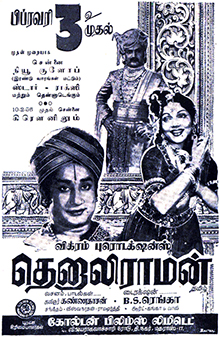
Tenali Raman is a 1956 Indian Tamil-language historical comedy film written and directed by B. S. Ranga, based on Ch. Venkataramaiah's play Tenali Ramakrishna. Produced for the banner Vikram Productions, the film stars Sivaji Ganesan, V. Nagayya, P. Bhanumathi, Jamuna and Thiruvengadam Chettiyar. Ranga also handled the cinematography while P. G. Mohan edited the film. Viswanathan–Ramamoorthy composed the soundtrack and background score.

Tenali Rama is an Indian Hindi-language historical comedy drama based on the life of the legendary Telugu poet Tenali Ramakrishna, one of the Ashtadiggajas at the court of Vijayanagara emperor Krishnadevaraya, who is often cited as the greatest Vijayanagara emperor. The series premiered on Sony SAB on 11 July 2017 and went off-air on 13 November 2020.













